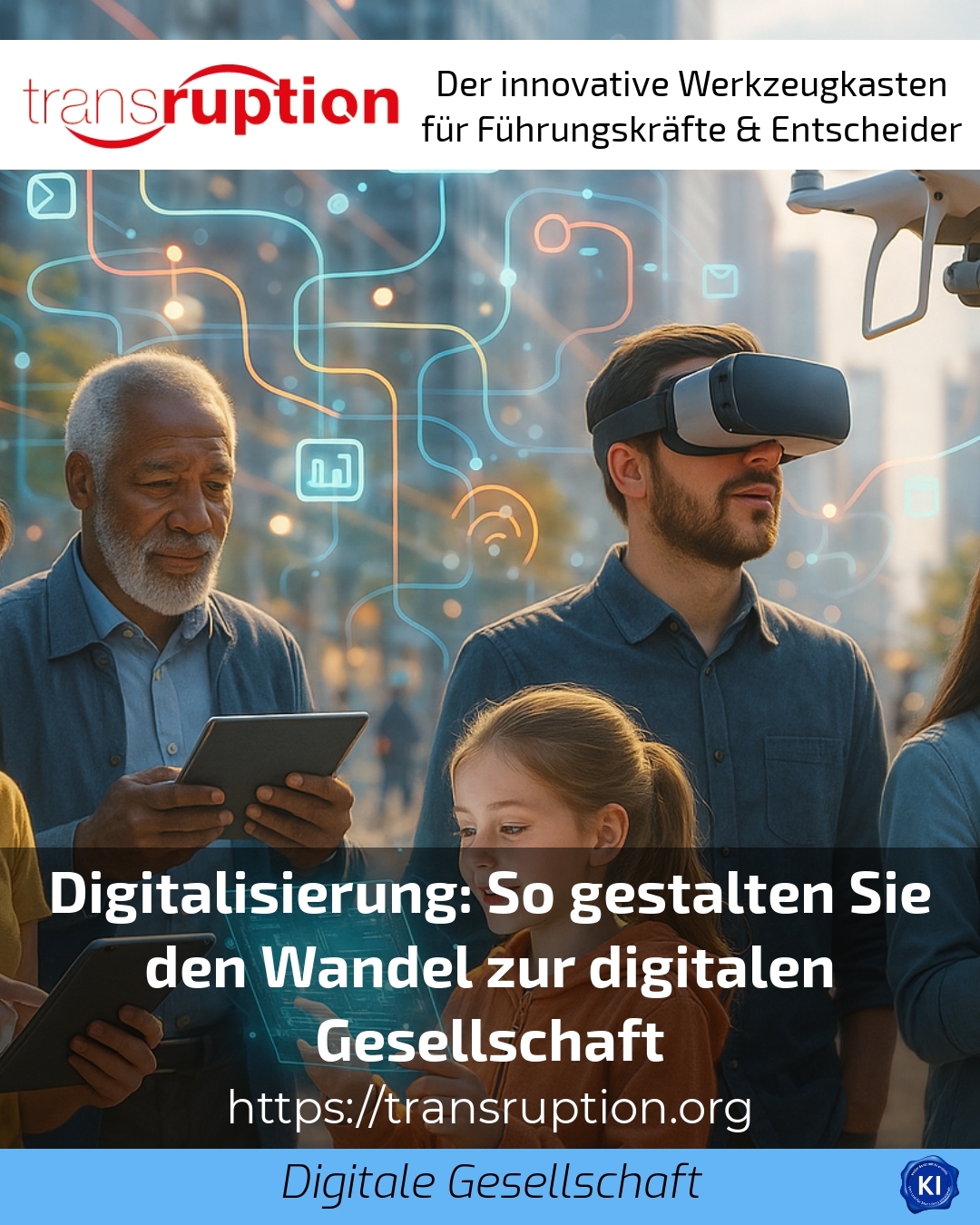Digitalisation as a driver of social change
Digitalisation is shaping all areas of life today and is a key driver of the transformation to a digital society. It is changing how people communicate, work and live. It is not just about technology, but above all about new forms of interaction, changing working environments and the opportunities that networked technologies open up. Many companies report that they often face organisational and cultural challenges in their digitalisation projects. This is where transruptions coaching provides impetus to constructively support the process.
Digitalisation and its diverse areas of application
Digitalisation can be seen in numerous examples from everyday life and the economy: online retail makes shopping easier by ordering products digitally and having them delivered quickly. Video conferencing enables teams to work together efficiently regardless of location, while social media platforms create new space for communication. At the same time, mobile applications such as GPS apps are used for navigation and booking systems for travel and events are handled digitally. This is creating new worlds of work and communication that present companies with a variety of challenges.
BEST PRACTICE at company XYZ (name changed due to NDA contract) In the course of a project to implement digital communication tools, we supported the introduction of virtual meeting rooms. This helped to improve collaboration between the international teams and significantly reduce travelling times. Employees reported that communication is now faster and more efficient, which supports project work overall.
Other examples from the industry show how digitalisation accelerates processes and creates new approaches at the same time. In the manufacturing industry, smart sensor technology and networked systems are optimising production cycles. In retail, digital dashboards support inventory management and improve the customer experience. And in the healthcare sector, digital patient records enable faster treatment.
Actively shaping digital transformation
The transition to a digital society will not succeed through technology alone. Companies and organisations should manage and support the change process in a targeted manner. This is where transruptions coaching comes into play: it supports companies in implementing digitalisation projects in a structured manner and provides impetus for shaping employee participation. This not only introduces technology, but also creates a culture that supports change.
BEST PRACTICE at ABC (name changed due to NDA contract) During the transition to digital work processes, we helped to gradually introduce new tools and involve employees in workshops. This increased acceptance and promoted productive use. The organisation reported a noticeable reduction in workload and more flexibility in the team.
Another important aspect of change is digital education and skills development. Studies show that digital sovereignty is crucial for moving safely and independently in the digital society. Companies, educational institutions and politicians are equally called upon to systematically promote digital skills. This is the only way to prevent people from being left behind by change.
Challenges and opportunities in the digital transformation
Although digitalisation offers a great deal of potential, there are also challenges to overcome. For example, the large number of technical innovations can cause uncertainty. At the same time, digital change is increasing the pressure on companies to adapt more quickly. Dealing with issues of digital security, data protection and ethical responsibility is fundamental. At the same time, more and more people see digitalisation as an opportunity for professional and personal development, if it is accompanied in the right way.
BEST PRACTICE at DEF (name changed due to NDA contract) As part of a digitalisation project, particular emphasis was placed on protecting sensitive data. Structured processes and targeted training helped to overcome security concerns among employees and customers. The digital switchover also provided an opportunity to create more transparent and trustworthy processes.
The sustainable design of digital technologies also plays a role. Digital solutions can conserve resources, for example by reducing transport routes or enabling smart energy systems. The digital society therefore also faces exciting and important tasks in the context of ecological change and social cohesion.
My analysis
Digitalisation is driving profound change in society and the economy. It makes sense to focus on an accompanied transformation that focuses on people, culture and organisation as well as technology. Transruption coaching can offer important support in this process by providing impetus and helping with the implementation of projects. The result is a digital society that is not only technically state-of-the-art, but also future-proof in terms of cultural and social interaction.
Further links from the text above:
[1] Focus on digitalisation: outlook for 2025 - Transform
[2] What is digitalisation & what is NOT? | AMBIENT
[4] D21 Digital Index 2024/2025
[5] Digital change: opportunities, challenges and the role of digital transformation - tixxt
[7] Digital Germany 2025 | Bitkom e. V.
For more information and if you have any questions, please contact Contact us or read more blog posts on the topic TRANSRUPTION here.
















